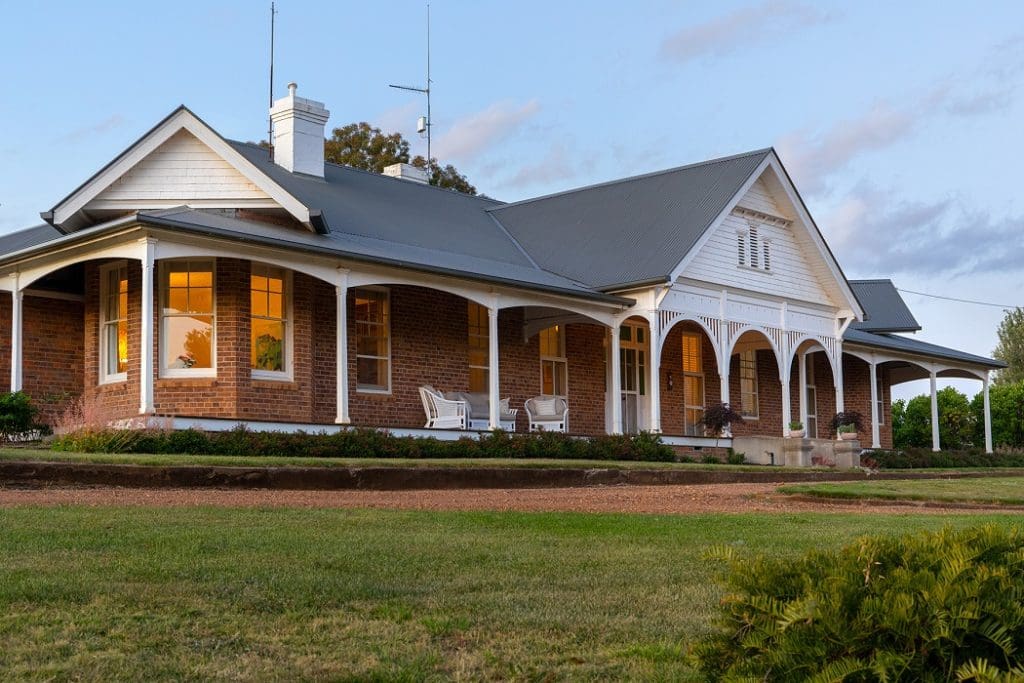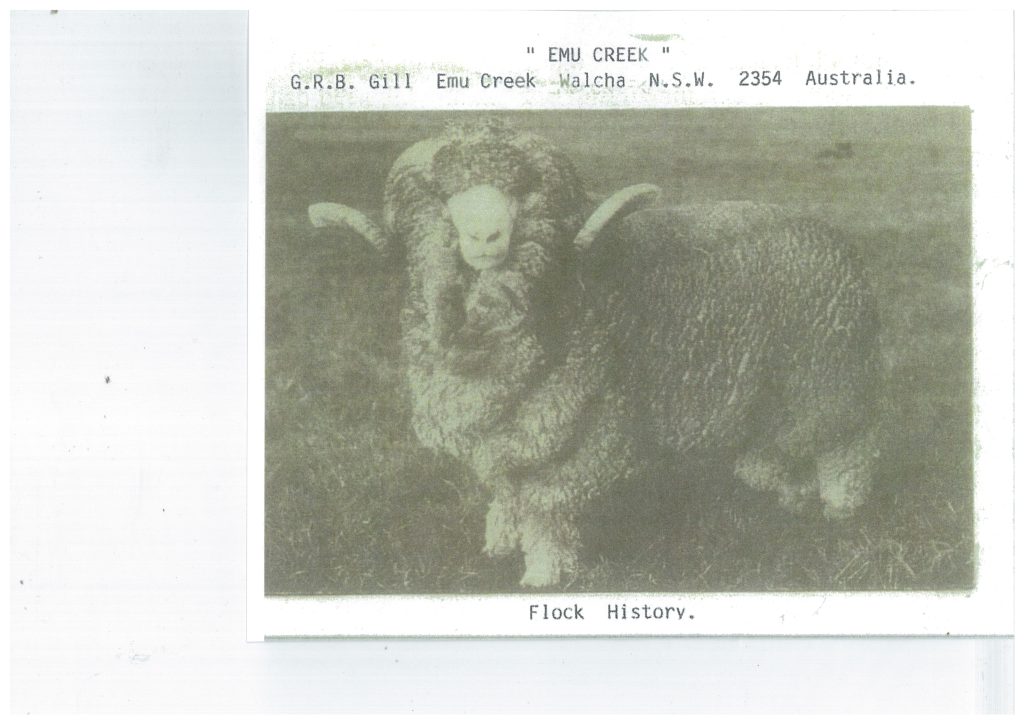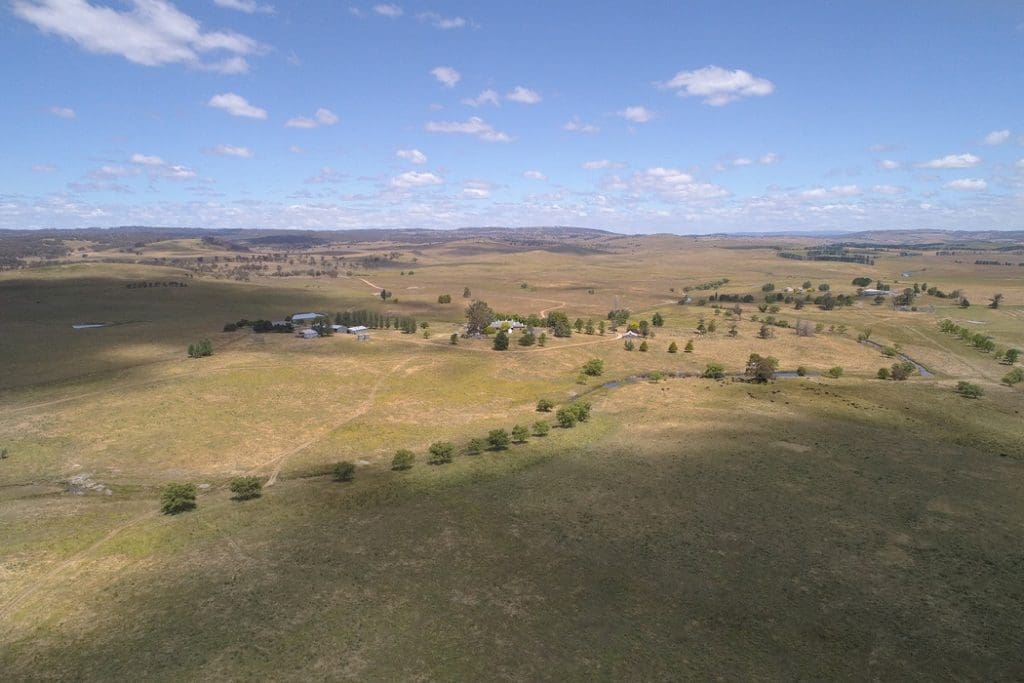
The Emu Creek homestead.
A PROPERTY that was the home of the first Vermont Merino sheep imported into Australia has been put on the market after 155 years in the hands of one family.
Walcha’s iconic Emu Creek is now listed for sale through LAWD by Expressions of Interest.
LAWD said the property located 13 kilometres from Walcha in New South Wales is to sell within the mid-$30 million range, reflecting its position in the sought-after and high rainfall grazing district, widely acclaimed for its consistently high production.
The property was originally purchased in 1868 for one pound per acre, and its 3026 hectares now features a well-maintained 1908 homestead. Over the last six generations it has been developed to be a thriving breeding and fattening operation, LAWD said.

A Merino ram used in the Emu Creek flock.
At Maitland Town Hall in 1868, Emu Creek was purchased by George Robert Gill for one pound per acre — the minimum price for rural land at the time. The property was sparsely developed with an old station cottage, a woolshed, barn, cultivation paddock, and a washpool nearby.
The property was gradually transformed into a superfine wool growing enterprise, comprising at one time of more than 40,498 hectares (100,000 acres). In 1874, Mr Gill was the first to import Vermont Merino sheep from San Francisco to Australia to establish his flock. He later formed a Merino stud on stock from Havilah Station, Mudgee – a property famous for breeding a fine strain of merino sheep. Rams were also introduced from Trefussis, Valleyfield, and Winton stud from Tasmania, as well as the Merryville stud of Yass.
Current holding has a 25,000 DSE capacity
The current holding has the capacity to maintain 25,000 DSE and is currently conservatively stocked with a mixture of late Spring calving cows, replacement heifers and Dorper ewes lambing on a nine-month cycle.
LAWD senior director Col Medway said the property is rich in history and posed a significant development opportunity. It would attract interest from parties in search of a premium grazing asset, he said.
“Emu Creek has been run and well maintained by current owners Mark and Angie Berry.
“It’s a privilege to have the opportunity to be involved in the transaction of such a remarkable and unique property,” Mr Medway said.
The property benefit from an average of 700mm rainfall per annum and will suit any institutional investor or large farming family looking for scale and will cater for any mix of livestock production, he said.
“There is also a significant opportunity for further development which will provide new owners with the ability to increase the operational scale of the property.”
Emu Creek ranges in topography from gently sloping alluvial creek flats to undulating low grazing hills and timbered ridgelines. Soils vary across the property to include fertile red and black basalt soils (Chocolate Soils and Euchrozems) through to New England Trap soils (Soliths, Red & Yellow Podzolics).
“An extensive soil testing program was undertaken by the current owners in December 2022 with the results demonstrating the soils are well-suited to a range of grazing enterprises on improved pastures and opportunistic cropping,” Mr Medway said.
“During their time, the Berry family has also invested in improving pasture and developing the water infrastructure on the site.”
More than 700 hectares of perennial grass and clover pastures have been improved, while 1,369 hectares are made up of open native grass and clover pastureland.
The property has a strong water supply through a number of sources, in part made up by a total 24km of frontage to a number of creeks including Dog Trap Creek, Emu Creek and Brookmount Creek. In addition, stock water is provided by a series of 28 dams, while six bores and a solar pump from Brookmount Creek deliver water to head tanks which gravity feed 37 strategically placed concrete troughs.
Vendors Mark and Angie Berry are fifth generation on the property and have chosen to sell as part of their future business plan.
“Emu Creek has been a wonderful home to all of us over the generations, and it has been an enormous privilege to be the custodian of this beautiful property,” Mrs Berry said.

An aerial view of Emu Creek.
Emu Creek wool was prized by overseas mills
In 1908, George Robert Gill II built the existing homestead with electricity and the telephone, which were modern amenities of the time. Steam engines were installed to drive farm machinery and the family was among the first in the area to embrace the automobile as their means of transport.
George Reginald Gill in the 1950’s embraced new technology including aerial application of superphosphate and clover seed, trucks, tractors, 240-volt electricity, modern telephone, refrigerators, electric heating, hot and cold running water and new shearing machines.
Emu Creek’s wool was prized by British, Italian and French mills. It was under George Robert Black Gill’s management that Emu Creek was recognised internationally as producing some of the finest superfine Merino wool in the world. The family achieved record prices on countless occasions and were repeat winners of the prestigious English Lumb’s Golden Bale Award and two-time winners of the Italian Ermenegildo Zegna Award.
Today, the grand 1908 homestead sits among the magnificent five-acre garden, meticulously maintained and renovated to incorporate modern living expectations, and is home to the family’s sixth generation.

HAVE YOUR SAY